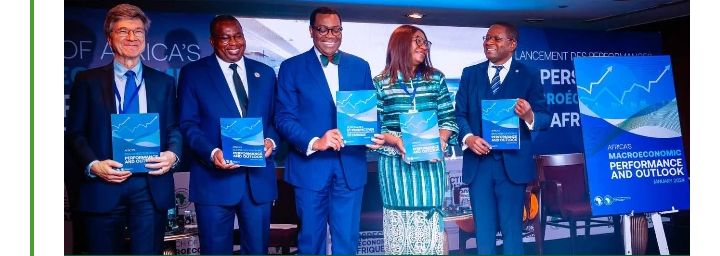Africa has emerged as the powerhouse of global growth in 2024, according to the latest report from the African Development Bank Group.
The report, titled “Macroeconomic Performance and Outlook,” predicts that Africa will host eleven of the world’s 20 fastest-growing economies this year, outstripping the projected global average.
The continent is poised to sustain its growth momentum, with real GDP expected to average 3.8% in 2024 and a further increase to 4.2% in 2025, surpassing the global averages of 2.9% and 3.2%, respectively. Africa retains its position as the second-fastest-growing region after Asia, signifying a robust economic trajectory.
Among the top-performing African nations, Niger leads the pack with a staggering growth forecast of 11.2%, followed by Senegal, Libya, Rwanda, and others showcasing impressive figures. Dr. Akinwumi Adesina, President of the African Development Bank Group, commended the continent’s resilience amid global economic challenges, urging for increased financing and policy interventions to sustain growth.
However, the report also underscores potential risks, including geopolitical tensions, regional conflicts, and political instability, which could disrupt trade and investment flows, and exacerbate inflationary pressures. Despite these challenges, fiscal deficits have shown improvement, with faster-than-expected recovery aiding revenue generation.
Prof. Kevin Urama, Chief Economist and Vice President of the African Development Bank, highlighted factors contributing to Africa’s growth, including economic diversification, strategic investments, and rising consumption. He emphasized the importance of sustained global resilience, disinflation, and fiscal consolidation for Africa’s economic resurgence.
Ambassador Albert Muchanga, Commissioner for Economic Development at the African Union Commission, stressed the significance of intra-African trade for economic integration, calling for enhanced regional cooperation.
The report’s findings and recommendations are set to inform African heads of state and guide discussions at international forums like the G20. It advocates for cautious optimism while urging structural reforms, industrial policies, and investments in human capital to drive sustainable growth.
In response to the report, Zimbabwe’s Minister of Finance and Economic Development, Prof. Mthuli Ncube, highlighted regional challenges such as climate shocks and debt restructuring, emphasizing the need for resilience-building measures and economic reforms.



